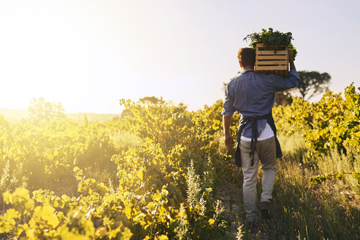Responsible consumption: definition
For the Upcoop group, an action or service is considered "responsible consumption" if it addresses at least one of the following three major issues:
- Environmental: contributing to reducing the ecological footprint, in particular by limiting greenhouse gas emissions or combating waste (of food, energy, raw materials, packaging, etc.).
- Social: supporting practices that respect human rights and decent working conditions, promoting fairness, inclusion and respect for stakeholders.
- Economic: promoting a sustainable economic fabric through local employment, short supply chains, the promotion of local expertise and cooperation between committed stakeholders.
What are the principles of responsible consumption?
Responsible consumption is a global attitude that questions the usefulness, origin, impact and sustainability of the products and services consumed.
Consume less but better
Faced with environmental constraints and accelerating overconsumption, the first principle of responsible consumption is moderation. This does not mean depriving oneself, but rather rethinking the value of each purchase: is it really useful, of good quality, and beneficial in the long term?
Consuming less does not mean settling for less. On the contrary, it means favouring products or services that are more reliable, more durable, often repairable, reusable or designed with quality materials. It also means turning to companies that share an ethical vision of consumption and are committed to concrete environmental, social or territorial action.
In short, responsible consumption means consuming less but better.
Favouring local products and short supply chains
Choosing local products and those from short supply chains gives new meaning to the act of purchasing in a responsible consumption approach. It strengthens the link between producers and consumers, while reducing transport-related emissions. Short supply chains promote better traceability and stronger regional roots, and contribute to the vitality of both rural and urban areas. They support craft, agricultural and commercial businesses that contribute to the vitality of their regions.
This principle also applies to businesses, associations and local authorities: directing their purchases towards local suppliers, organising events with regional producers and incorporating proximity criteria into their calls for tenders are all actions that promote a circular and resilient economy.
Choosing products that respect the environment and your body
Adopting responsible consumption means paying particular attention to the composition of products, manufacturing methods and what we eat.
Environment:
- Choose locally manufactured products made from renewable raw materials that require less energy or water to produce.
- Choose eco-labelled or certified products (European Ecolabel, FSC, PEFC, etc.), which guarantee a controlled impact throughout their entire life cycle.
- Avoid single-use items and multiple or non-recyclable packaging in favour of sustainable, returnable or reusable formats.
But responsible consumption also means paying attention to what we put on our skin, breathe in or ingest. Many cleaning products, cosmetics, textiles and packaging contain controversial substances, including endocrine disruptors. To limit these, it is recommended to choose simple, certified products made from natural or organic ingredients and free from unnecessary additives. This vigilance helps to protect everyone's health and reduce our collective impact on ecosystems.
Paying attention to social and human conditions of production
Responsible consumption makes us question the conditions under which goods are produced. Behind a product may lie unethical practices: forced labour, indecent wages, human rights violations, or worker insecurity.
To consume ethically, choose products from transparent and certified supply chains: fair trade labels, clear traceability of origin and manufacturing conditions. Responsible brands communicate this information, while others conceal it. It is also a challenge for organisations to ensure that their suppliers comply with these standards.
Adopting a circular economy approach
Responsible consumption also means extending the life of goods. The circular economy is based on a simple idea: reduce, reuse, recycle. Every good can have several lives, provided it is designed and used with this in mind:
- Repair instead of replacing.
- Donate, resell, lend, share.
- Recycle or choose recycled products.
Adopt conscious and useful consumption
Before buying, ask yourself a simple question: do I really need this, and what is the impact of my purchase? This is the reflex of responsible consumption. Too often, purchases are impulsive, dictated by habit or consumer society, without consideration for actual use or overall impact.
Adopting conscious consumption means: questioning the necessity of the purchase, checking the origin, composition and recyclability of products, favouring goods that are useful, durable, repairable, or have shared value (rental, loan, pooling).
This approach applies to individuals and organisations alike: businesses, local authorities and associations can incorporate these criteria into their purchasing, endowments or the services they offer to their beneficiaries.
What are the future prospects for responsible consumption?
Since globalisation and the development of industry, responsible consumption has not appeared overnight. It is the result of a gradual awareness, driven by the visible impacts of a linear, globalised and intensive consumption model.
From traditional consumption to overconsumption
After the Second World War, France entered a period of unprecedented growth: the Trente Glorieuses. This era was marked by increased access to consumption, made possible by rising incomes, mass industrial production and the widespread availability of credit. Consumption became a social marker, a symbol of progress and success.
Over the decades, this model became more radical. Advertising, product standardisation and faster replacement cycles stimulated demand. People bought more, faster, often at the expense of quality, natural resources or production conditions. This was the advent of overconsumption, characterised by planned obsolescence, disposability and a disconnect between production and actual use.
Today, the consequences of this model are palpable: climate change, resource scarcity, waste saturation, but also psychological exhaustion and a loss of meaning. Responsible consumption is emerging in response to this imbalance, offering a more sustainable, fairer vision that refocuses on the essentials. Ultimately, it is like a return to our roots, in a different era.
Awareness and transition to responsible consumption
The 2000s marked a turning point. The environmental, social and health impacts of our consumption model came to light: pollution, health scandals, working conditions in supplier countries, overproduction of plastic, etc. This reality is prompting a growing proportion of the population to rethink their habits. The climate crisis is acting as a powerful catalyst for responsible consumption. According to the GreenFlex Barometer of Responsible Consumption (2024 edition), four out of five French people believe that the environmental emergency requires us to rethink our lifestyles:
- 77% say they are committed to responsible consumption,
- 59% have already changed their daily practices to reduce the impact of their purchases.
This transition is both cultural and generational. It concerns citizens as well as private and public organisations, which are called upon to adapt their practices to meet new expectations.
Current share of responsible consumption and future trends
Responsible consumption has reached a turning point. According to the GreenFlex 2024 Barometer:
- 64% of French people believe that "producing differently is not enough, we need to produce less".
- 73% believe that we also need to consume less.
These figures reflect growing demands on brands, but also a change in individual attitudes. Consumers no longer want to be reduced to their purchasing power, but are demanding the power to act: to choose, to arbitrate, to inform themselves, and to influence decisions through their purchasing behaviour.
However, price remains the main obstacle. In a context of inflation, more sustainable or local products often appear to be more expensive, which limits their adoption by all audiences. This is why many complementary levers must be activated: consumer education, targeted aid, incentives, increased accessibility.
Another powerful lever is the collective ripple effect. Seeing those around us get involved and noticing that local businesses and communities are incorporating these principles into their actions helps to strengthen support. Responsible consumption progresses all the more quickly when it becomes visible, tangible and shared.

What are the challenges for businesses, associations and local authorities in relation to responsible consumption?
Responsible consumption is a new economic, social and regulatory reality. Between user expectations, legal developments, pressure from stakeholders and market transformations, organisations must adapt. And quickly.
Economic and commercial challenges
Responding to growing demand, anticipating market developments, strengthening competitiveness: responsible consumption is reshuffling the deck. It is profoundly changing purchasing habits, selection criteria, distribution channels and loyalty levers.
In concrete terms, companies and organisations that embrace these expectations can:
- Adapt their offering by developing eco-responsible, local, sustainable, repairable or fair trade products or services.
- Differentiate themselves through responsible innovation, ethics and transparency.
- Access new growth markets: organic, zero waste, circular economy, fair trade, etc.
Responsible consumption is becoming a marker of trust and credibility.
Regulatory and compliance issues
Unsurprisingly, the transition to responsible consumption is being driven by the legal framework.
Some key obligations to be aware of:
- Anti-waste law for a circular economy (AGEC):
Objective: to transform our linear model (produce, consume, throw away) into a circular model based on waste reduction, reuse and recycling.
Examples: ban on single-use plastics, obligation to offer reuse solutions, end of destruction of unsold non-food items.
- EGalim Law:
Objective: to promote healthier, more sustainable and fairer food, particularly in public catering.
Examples: at least 50% sustainable products (including 20% from organic farming) in school canteens, hospitals, etc.
- Climate and Resilience Law:
Objective: to accelerate the ecological transition by integrating the environment into all spheres of society (food, transport, housing, consumption).
Examples: ban on disposable tableware in restaurants with more than 20 covers (2023), obligation to accept containers brought by customers (since 2021).
In addition, there are measures such as:
- Mandatory labelling (Nutri-score, repairability index, environmental labelling to come).
- Increasing restrictions on certain products (textiles, packaging, chemicals, etc.).
Adopting a proactive approach helps to secure your business, optimise your processes and be recognised as an exemplary player.
Social and territorial issues
Responsible consumption is also an opportunity to strengthen the links between organisations and their local area. By supporting local players and promoting local expertise, businesses, local authorities and associations can generate a lasting positive impact that is closely aligned with citizens' needs.
- Creation of local jobs and maintenance of activities in areas that are sometimes vulnerable.
- Strengthening the local economic activity through short supply chains, local partnerships, and craft or agricultural sectors.
- Support for inclusive structures through integration via economic activity and mission-driven organisations.
Responsible consumption enables a richer dialogue with stakeholders (residents, elected officials, users, associations) by co-constructing useful, transparent projects that are aligned with expectations.
Environmental challenges
Faced with the climate emergency and the depletion of natural resources, organisations have a role to play in steering their purchasing, offerings and practices towards more sustainable models.
This involves:
- Reducing greenhouse gas emissions through short supply chains, less processed products and optimised logistics.
- Reducing waste by favouring bulk purchases, deposits, reuse and eco-design.
- Preserving natural resources (water, soil, biodiversity) by choosing products from organic, sustainable or seasonal agriculture (fruit, vegetables, fish).
Adopting responsible consumption also means strengthening resilience in the face of future environmental crises: by securing supply chains, promoting local production and reducing dependence on critical raw materials.
Innovation and strategic evolution challenges
Responsible consumption is not a barrier to innovation — it is an accelerator. To remain relevant, organisations must integrate these expectations into their models, rethink their products, services and even their operating methods:
- Reinventing product design: eco-design, repairability, durability, reduced packaging.
- Integrating digital transparency tools: blockchain, QR codes, traceable platforms to provide information on the origin, impact or composition of products.
- Adapt user experiences: offer personalised, engaging services that reward responsible behaviour (bonuses, prize pools, etc.).
This change often involves strategic reorganisation, upskilling teams and redefining internal priorities.
How can we anticipate growing trends in responsible consumption?
Faced with rapidly changing societal and regulatory expectations, organisations must be proactive. Anticipating trends in responsible consumption means adapting sustainably to a new set of values, practices and performance standards.
Strengthening strategic monitoring
Companies, local authorities and associations must develop active monitoring to understand the underlying trends that are shaping new consumer behaviours, such as responsible consumption.
This involves regularly monitoring specialist barometers such as those produced by ADEME or GreenFlex, but also reading between the lines of forward-looking reports on ecological and societal transitions. Social media, collaborative platforms, feedback from beneficiaries or users, and changes in usage in the field are all valuable sources of information.
Strengthening your monitoring means staying one step ahead. It means understanding what audiences will expect tomorrow, identifying innovative partners, and adjusting your strategy before standards change. The goal is not to react under pressure, but to choose to evolve, with full knowledge of the facts, and to commit to change.
Investing in eco-design now
Eco-design is not just about doing "less harm". It is a way of thinking differently, right from the start or the design stage. An integral part of responsible consumption, it consists of incorporating environmental and social criteria from the moment a product or service is created: choice of raw materials, manufacturing processes, logistics, end use, end of life, etc.
Rather than correcting downstream, we anticipate. In concrete terms, we favour recycled or bio-based materials, reduce the number of components, limit packaging, and design objects that can be dismantled, repaired and reused. In the digital world, this involves eco-designing websites with lightweight code, energy-efficient colours (dark and black colours) and optimised content.
Visit our first eco-designed website the meal voucher simulator.
Developing total transparency and traceability
Trust must be earned. And today, it is built on social proof. In the context of responsible consumption, consumers, and even customers or partners, want proof, data and clear explanations.
This means that organisations need to deploy robust traceability tools that allow them to track the origin of raw materials, production conditions, processing stages and even the environmental impact of a product. These tools can include QR codes on packaging, mobile applications or publicly accessible dashboards.
A company or local authority that takes responsibility for its choices and demonstrates honesty strengthens its credibility.
Download our Extra-financial report to find out more.
Adapting employee benefits to more sustainable consumption
With employee benefits such as meal vouchers or gift cards, companies, social and economic committees (CSEs) and local authorities can encourage beneficiaries to make responsible consumption choices.
At Upcoop:
- For Upcoop déjeuner card users, more than 15,000 eco-friendly establishments have been identified and certified. These shops, restaurants and specialist retailers meet criteria such as vegetarian cuisine, local products, organic produce, homemade food, bulk purchases, anti-waste initiatives, etc.
- A "Consume Responsibly" filter is available on the UpDéjeuner and UpCadhoc Store Locators, allowing beneficiaries to easily identify eco-responsible acceptance points according to predefined criteria.
- Our Up+ loyalty programme allows users to earn bonuses whenever they make a purchase with their Upcoop déjeuner card at a participating retailer or restaurant. It's a fun and motivating way to encourage responsible consumption.
- A partnership with Mapstr allows Upcoop's eco-friendly locations (restaurants, shops, pubs, bakeries, etc.) to be mapped and easily found on its app. Users can explore, filter and try out places that match their preferences.
Collaborating with committed partners and local authorities
Responsible consumption is a collective challenge. To have a real impact, it requires strong alliances between businesses, local actors and public institutions. Together, they can create virtuous circles: structuring local supply chains, supporting reuse initiatives, promoting the circular economy and directing public aid towards committed actors.
At Upcoop:
- With local retailers and specialised networks, Upcoop is building an ecosystem that promotes short supply chains, second-hand goods, bulk purchases and sustainable food.
- Local authorities can direct their aid and subsidies towards local players thanks to the personalised missions of the Up+ programme. This makes it possible to channel public spending towards organic, fair trade and certified shops, among others, and maximise the impact on the local area.
- For example, Upcoop collaborated with the Gers department on the "Mieux man'Gers pour tous" (Better Gers for all) mission. The aim is to revitalise the town centre and support local retailers by promoting Upcoop déjeuner vouchers as part of a commitment to responsible consumption.
What are the labels and certifications for responsible consumption?
To consume responsibly, you need to be able to identify products or services that are truly responsible. Labels and certifications help you do just that.
Labels and certifications related to sustainable food and agriculture
These labels regulate agricultural and food practices to guarantee healthy, ethical and environmentally friendly products.
- Agriculture Biologique (AB): French label certifying that products are organically farmed, free from chemical pesticides and GMOs (Genetically Modified Organisms), and respectful of biodiversity and human and animal health.
- Euroleaf (EU organic logo): the European equivalent of AB, it guarantees compliance with strict organic farming criteria throughout the European Union.
- Fairtrade/Max Havelaar: an international label ensuring fair remuneration for producers, decent working conditions and promoting sustainable agricultural practices, particularly in southern countries.
- MSC (Marine Stewardship Council): environmental label for seafood products from sustainable fisheries that respect marine ecosystems and fish stocks.
Écotable : sustainable catering label promoting restaurants committed to traceability, waste management and local sourcing.
Upcoop offers Upcoop déjeuner card holders the opportunity to earn Up+ bonuses by having lunch at an Écotable restaurant.
Bistrot de Pays: a label that supports rural cafés and restaurants by promoting local cuisine, social ties and short supply chains.
Upcoop works with the Fédération Nationale des Bistrots de Pays to encourage Upcoop déjeuner cardholders to support these establishments.
Labels and certifications for materials, resource management and eco-friendly products
These labels certify efforts to reduce the environmental impact throughout the entire life cycle of products, materials or services.
- European Ecolabel: official European Union certification for products and services with low environmental impact (furniture, maintenance, accommodation, etc.). It assesses the ecological performance of products from manufacture to disposal.
- FSC (Forest Stewardship Council) and PEFC (Programme for the Endorsement of Forest Certification): labels guaranteeing that wood or paper comes from sustainably managed forests, using practices that respect the environment, local populations and workers.
- Imprim'Vert: certifies that printers comply with strict criteria regarding hazardous waste management, product safety and the non-use of toxic substances.
- ISO 14001: international standard for environmental management. It validates an organisation's commitment to controlling and reducing its environmental impact.
Upcoop is ISO 14001 certified for environmental management and PEFC certified for its responsible purchasing policy.
Labels and certifications for textiles and cosmetics
These labels regulate the composition of textile and cosmetic products and their manufacturing conditions to ensure responsible consumption.
- Oeko-Tex: an international label that certifies the absence of substances harmful to health in textiles at every stage of their production (dyes, finishes, accessories, etc.).
- Cosmebio: a French label guaranteeing cosmetics made from natural and organic ingredients that are kind to the skin and the environment. It also imposes ethical criteria on packaging and transparency.
- Ecocert: an independent certification widely used for cosmetics, cleaning products and food supplements. It guarantees that products are made from natural, biodegradable ingredients and manufactured in an eco-responsible manner.
Labels and certifications for corporate social and environmental responsibility (CSR)
These labels assess organisations' overall commitments to CSR, ethics, transparency and territorial impact.
- B Corp: a demanding international certification that assesses companies' social, environmental and governance performance. It involves a strong commitment and regular review.
- EcoVadis: CSR assessment platform that assigns scores based on environmental, social, ethical and responsible purchasing criteria.
The Upcoop cooperative was awarded the EcoVadis gold medal in 2023, ranking it in the top 5% of the EcoVadis CSR assessment. Several international subsidiaries have obtained certification (Up Romania, Up Sí Vale in Mexico, Up Slovensko, Up Spain, etc.), including Up Day, the Italian subsidiary, which obtained the Platinum medal, the highest distinction in the ranking.
- La Clef Verte: the leading international sustainable tourism label for accommodation and restaurants. It guarantees a reduction in environmental impact (water, waste and energy management, etc.).
Appart'City and Best Western residences, partners of the Upcoop cadhoc network, are Green Key certified. These establishments can be identified on the Store Locator using a dedicated filter.
Labels guaranteeing origin and support for the local economy
- Origine France Garantie: a label certifying that the product has acquired its essential characteristics in France and that 50 to 100% of its cost price is of French origin. It promotes local employment, traceability and French industrial know-how.
Upcoop, facilitating responsible consumption
At Upcoop, we believe that responsible consumption should be accessible, practical and encouraged. Our mission, as a mission-driven company, is to empower everyone — individuals, communities, businesses and retailers — to take action at their own level.
Deploying tools to measure consumption
Understanding the impact of your consumption is the first step towards sustainable consumption. At Upcoop, we develop innovative tools to enable our beneficiaries to visualise, analyse and change their habits in a concrete way.
- The carbon calculator, currently being rolled out internationally, is already active in Belgium. It allows Upcoop déjeuner card users to view the carbon footprint of their purchases directly in their mobile app. Beforehand, they enter their food preferences (e.g. meat consumption, vegetarian, etc.). In return, they receive personalised advice and content to help them reduce their impact.
- A chatbot dedicated to responsible consumption is integrated into the beneficiary journey in certain countries: in Italy, a chatbot providing information on responsible consumption; in Belgium and Brazil, a "seasonal products" chatbot to encourage people to consume locally and at the right time.
Supporting committed organisations
We believe in the power of partnerships to bring about lasting change in consumption patterns. By supporting innovative and committed organisations, we are helping to accelerate the transition to responsible consumption.
- Réseau Vrac et Réemploi
We are partners of Réseau Vrac et Réemploi, an association that works to structure and develop the bulk and packaging reuse sector in France. Together, we pursue a clear objective: to reduce single-use packaging and encourage more sustainable consumption patterns. The network operates on several levels: it trains professionals, supports retailers, and organises events for the general public, such as Bulk and Reuse Month. It also offers a mapped directory of bulk retail outlets, masterclasses, and an annual trade show for industry players.
At Upcoop, we promote these initiatives by including bulk retailers in our Up+ scheme via the Upcoop déjeuner card.
- Clorofil
The Upcoop cooperative, issuer of Upcoop déjeuner meal vouchers, has joined forces with Clorofil to help cafés, hotels and restaurants affiliated with Upcoop déjeuner reduce their carbon footprint. This partnership aims to reduce the carbon footprint of a sector that accounts for 13% of greenhouse gas emissions from tourism in France. Thanks to the Clorofil platform, restaurateurs can carry out a simplified carbon assessment of their business free of charge. More than 170 practical fact sheets are available to help them embark on a reduction trajectory in line with the objectives of the Paris Agreement. Participating establishments receive a Clorofil badge and a communication kit enabling them to promote their efforts to their customers.
- Bio Culture
We are partners with Bio Culture to make healthy, local, organic and seasonal food more accessible. Bio Culture offers 100% organic and French baskets of fruit and vegetables distributed via more than 45 collection points in the Île-de-France region. More than 140 partner companies already benefit from this service, which allows employees to order individually or in groups.
We also support the upstream sector: 30 partner organic farmers, certified by AB and Ecocert, are fairly remunerated. They are free to set their own prices to guarantee quality, traceability and respect for living organisms. The baskets can be paid for with the Upcoop déjeuner card, and a dedicated Up+ mission is available in the Upcoop application to encourage responsible consumption.
- Recettes & Cabas
We support our beneficiaries in responsible consumption with our partner Recettes & Cabas. Recettes & Cabas offers a service providing ready-to-cook baskets, based on balanced, varied recipes that are updated every week, with fresh, local and seasonal produce. The process is simple: beneficiaries choose their recipes according to their preferences, adjust the quantity according to the number of guests (2, 4 or 6 people), and have their basket delivered directly to their home or workplace.
Find out more about our solutions that support responsible consumption





























![[Translate to anglais:] [Translate to anglais:]](/fileadmin/_processed_/1/8/csm_Portrait_Youssef_Achour_90c4c665fd.jpg)

